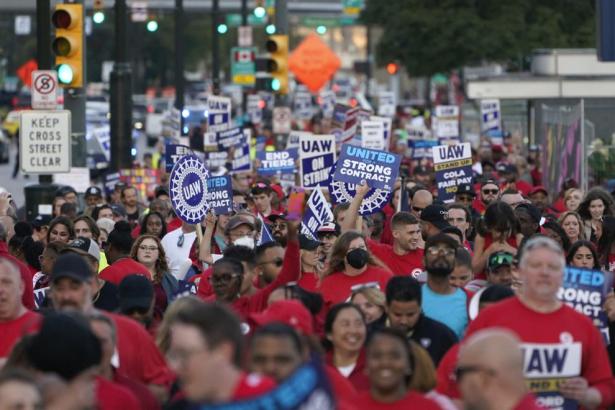When Dwight Eisenhower was running for president in 1952 as the nominee of a saner Republican Party, he appeared at the American Federation of Labor convention and delivered a full-throated embrace of industrial unions.
“Today in America unions have a secure place in our industrial life,” Eisenhower told the delegates. “Only a handful of unreconstructed reactionaries harbor the ugly thought of breaking unions. Only a fool would try to deprive working men and women of the right to join the union of their choice.”
Well, Ike, meet the Republicans who are running for your party’s 2024 presidential nomination. Since United Auto Workers union members struck the Big Three automakers, GOP candidates have confirmed that the party of Eisenhower is now the party of unreconstructed reactionaries.
While Democrats such as President Joe Biden and Wisconsin U.S. Rep. Mark Pocan have joined UAW picket lines — and echoed the union critique of the auto companies, declaring that “record corporate profits should be shared by record contracts for the UAW” — Republicans like Sen. Tim Scott of South Carolina want to fire the strikers.
Recalling former President Ronald Reagan’s decision to dismiss striking members of the Professional Air Traffic Controllers Organization in 1981, Scott said, “I think Ronald Reagan gave us a great example when federal employees decided they were going to strike. He said, ‘You strike, you’re fired.’ Simple concept to me, to the extent that we can use that once again.”
The anti-union senator’s proposal to extend Reagan’s assault on public-sector workers to the private sector drew a stiff rebuke from the UAW. Union President Shawn Fain ripped Scott’s remarks as “just another example of how the employer class abuses the working class in America; employers willfully violate labor law with little to no repercussions.”
Fain filed a complaint against Scott with the National Labor Relations Board on Thursday and declared, “Time for more stringent laws to protect workers’ rights!”
Scott was hardly an outlier among the top GOP contenders.
Former UN Ambassador Nikki Haley, an anti-union zealot in the mode of former Wisconsin Gov. Scott Walker, denounced both Biden and the UAW strike.
“When you have the most pro-union president and he touts that he is emboldening the unions, this is what you get,” griped Haley. “The union is asking for a 40% raise, the companies have come back with a 20% raise. I think any of the taxpayers would love to have a 20% raise and think that’s great.”
And of course Haley failed to acknowledge that the union demand for a 40% pay bump merely parallels the increase in pay for CEOs in an industry that has made $250 billion in profits over the past decade.
As ugly as the anti-worker rhetoric from Scott and Haley has been, there’s a case to be made that the most crudely anti-union sentiments were expressed by Donald Trump, the former president who for years has sought — cynically, but with some success — to fool industrial workers into imagining him as their ally. Since the strike began, Trump's rhetoric has been even more anti-union, and more disingenuous, than that of the CEOs of GM, Ford and Stellantis.
During an appearance on NBC’s “Meet the Press” last week, Trump was asked which side he was on in the strike. Trump pointedly avoided taking the side of the strikers and their union. “I’m on the side of making our country great,” he announced, before launching into a critique of electric vehicles.
As part of his diatribe, Trump ripped into UAW leaders and members for focusing in negotiations on preserving jobs and improving pay and conditions as the industry transitions to electric vehicle production.
“The auto workers are being sold down the river by their leadership,” claimed Trump, who alleged that Fain is “not doing a good job in representing his union, because he’s not going to have a union in three years from now. Those jobs are all going to be gone, because all of those electric cars are going to be made in China.”
Trump’s playing one of the oldest cards in the corporate deck, seeking to drive a wedge between workers and their union. He planned to up the ante Wednesday with an appearance in Detroit. But the union is having none of it. Though the UAW has not made an endorsement in the presidential race, Fain ripped into Trump.
“Every fiber of our union is being poured into fighting the billionaire class and an economy that enriches people like Donald Trump at the expense of workers,” said Fain. “We can’t keep electing billionaires and millionaires that don’t have any understanding what it is like to live paycheck to paycheck and struggle to get by and expecting them to solve the problems of the working class.”
Trump would have done better to study up on the perspective of Eisenhower, who referred to right-wingers who attacked labor laws as “stupid” and said, “I have no use for those — regardless of their political party — who hold some foolish dream of spinning the clock back to days when unorganized labor was a huddled, almost helpless mass.”
There is nothing huddled or helpless about the UAW. It’s fighting for worker rights, and polling shows that — no matter what these Republican presidential contenders say — 75% of the American people are on the union’s side.
John Nichols is associate editor of The Capital Times. jnichols@captimes.com and @NicholsUprising.


Spread the word